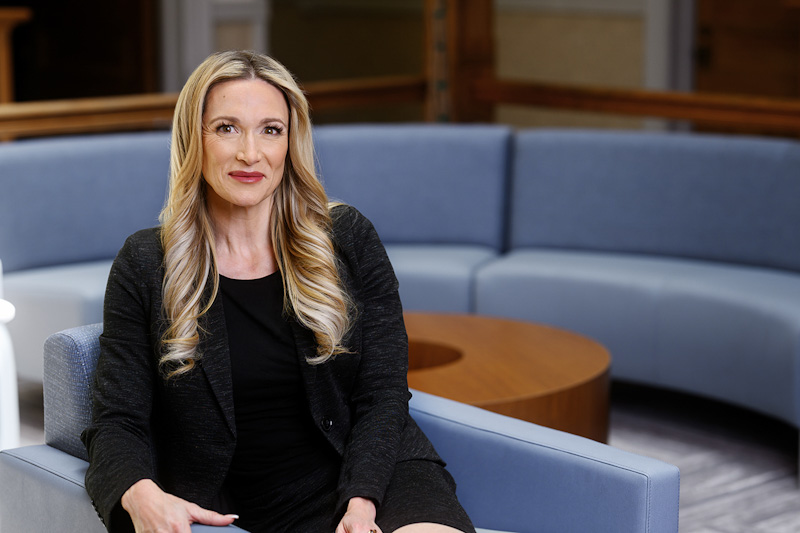Inspired by a movie, this attorney then made herself indispensable

“If you think in your mind how you want your career to be, then it becomes almost easy,” says Erika Gasaway, a partner at Lathrop GPM who’s based in San Jose, California. (Photo by Benjamin Krantz)
An ’80s movie was the unlikely inspiration for one partner who took its message to heart. In high school, Erika Gasaway watched Bull Durham, a 1988 baseball film starring actor Kevin Costner. In one famous scene, a seasoned catcher (Costner), tells a young pitcher played by actor Tim Robbins that he can’t make it to the big leagues if he has fungus on his shower shoes. “Think classy, and you’ll be classy,” he said.
Gasaway heard the message and adapted it when she became a lawyer: “If you think like a partner, you’ll be a partner.” But it was many years later when that missive would become her reality.
First, she took a detour. She graduated college in the dot-com age and took a job at technology company Intel as a community relations manager.
“One of the things that Intel’s culture was good at was helping people figure out what they were good at,” says Gasaway, a partner at Lathrop GPM who’s based in San Jose, California.
At Intel, she took a lot of career advancement classes, marveling that she never realized that she was a talented public speaker. She was also very determined, which was key for the career that she was about to select.
After attending the Santa Clara University School of Law in California, Gasaway was offered a position at Bingham McCutchen, a now-defunct BigLaw firm in Palo Alto, California.
“My strategy was to figure out, ‘Who can I get close with?’” Gasaway says. “I took every opportunity to hang out with people, whether that was in the office or out of the office.”
Gasaway started noticing which partners were bringing in the big cases, and she spent time mastering the firm’s document review system.
Her big break came in the form of a last-minute potential catastrophe during her second year at the firm.
An associate rushed into her office, frantically trying to find relevant caselaw for a partner who was at a deposition with a nonparty client. The opposing counsel refused to let the client attend on the grounds that nonparties are not permitted at depositions.
Gasaway, using her knowledge of the document review system, got to work immediately, finding cases on online legal research database Westlaw in the same jurisdiction that analogized depositions to trials, which are proceedings open to the public.
She passed the information along, and the partner used her research in an argument with the discovery referee, and the client was permitted to attend.
“It helped the other senior associates to see that I would drop what I was doing to help them in a pinch, and for the partner, it showed that I had the skills,” Gasaway says.
Many more last-minute opportunities followed, and Gasaway found herself logging many midnights at her desk.
But after three years of plowing along at an accelerated rate, Gasaway realized that while she wanted to make partner, she also wanted her life back. She recalls one colleague telling her that he had a fantastic vacation in Hawaii because he was able to wake up before dawn to get his work done before the rest of his family opened their eyes. This wasn’t the tale that Gasaway wanted to hear.
In 2013, Gasaway moved to Hopkins & Carley, now known as Lathrop GPM, when it was a relatively smaller firm in San Jose. She was named a partner this year, though she made her personal boundaries very clear far sooner.
“For me, balance means that when I can drop everything and focus on work; that’s what I do,” Gasaway says. “But when my family needs me, I’m out.”
This was tested in 2018, when Gasaway’s mother got sick, and Gasaway’s family was providing in-home hospice care. She was out of the office for six weeks.
“I asked my firm to support me, and they did,” she says. “But if they weren’t going to, I was going to quit. That was a commitment that I made for myself.”
Gasaway, recently divorced, took another month off work in March, when her father was diagnosed with cancer. Again, she was supported by her firm, which made Gasaway realize that she could have boundaries and be partner. It was all part of her long-term plan.
“If you think in your mind how you want your career to be, then it becomes almost easy,” she says.
Path to Partner is a new ABA Journal series of short stories profiling lawyers who became partner at their law firms and the steps that they took to get there.
Write a letter to the editor, share a story tip or update, or report an error.


